PublicationsMonographies, book chapters and conference proceedings by Robert Belot
MONOGRAPHIES
BOOK CHAPTERS
|
| |
|
| |
|
|
CONFERENCE PROCEEDINGS
Forthcoming publication
|
"The narrative identity of the European project: a case of cultural and historical self-institution"
This subject has been informed by the lectures we have given to our history students and by exchanges between colleagues at seminars and colloquia. We intend to publish it in Open Access in French and English. The notion of ‘culture’ is understood here in its broadest possible sense: it encompasses history, cultural assets (tangible and intangible), worldviews and values. To this end, we conduct surveys (archives, testimonials, etc.). This study is aimed at teachers, politicians, students and all European citizens trying to understand the importance of Europe today and in the past. The Theme: It is said that Jean Monnet, at the end of his life, said that if he had it to do over again, he would start with culture. In fact, this is a truncated phrase, uttered by Hélène Ahrweiler, Rector of the Académie de Paris, to European students in 1988: ‘If I had it to do over again, I'd start with culture,’ Jean Monnet might exclaim, if he were to return to us! So the ‘father’ of Europe is not the author of this famous line, and we think he couldn't have been, for reasons we'll try to elucidate. Nonetheless, the question legitimately arises. Why was this order of priorities (economics before culture) chosen? The origins of this book lie in a desire to elucidate the way in which Europeanists talk about Europe and its identity, through a discourse on its historical-cultural roots and its axiological and political project. Our starting hypothesis is that two discursive regimes can be distinguished, depending on the nature of the European political project: I. the discourse of pro-European political actors, for whom recourse to culture and history has long been a mere rhetorical posture, as they fit into the horizon of expectations of a liberal (non-federal) Europe that preserves stato-national identities while guaranteeing a free economic market that protects the interests of each partner; II. the discourse of European activists (notably federalists), for whom history reveals the ‘spiritual unity’ of Europe, pre-existing the States; culture thus has a foundational virtue for the elaboration of the political project aimed at the emergence of a post-national federal Europe. On the one hand, a discourse that unfolds within a ‘functionalist’ framework and is content to decline the consensual dialectic of ‘unity in diversity’ (and vice versa). On the other hand, a ‘meta-narrative’ that embraces Europe's origin, nature and purpose, and which is intended to legitimize an action that transforms reality (for example, the general policy motion voted at the founding congress of the European Union of Federalists in Montreux, in 1947, maintains that the European idea constitutes a ‘dynamic principle that transforms all human activities’). It is this difference between the two approaches, and the tension it provokes, that lies at the heart of our problem. How are these two narrative regimes compatible with what both history and historians tell us? How are they being re-interrogated today by rereadings of World history guided by the questioning of Europe as a model of productivism and colonialism? |
Editing of a special issue of a Journal
|
‘The Lessons from the Failure of the European Defence Community (1954)’, L'Europe en formation, Journal of Studies on European Integration and Federalism, n°395, 63nd year, Nice (France), Winter 2022/2.
This is a collective work (also distributed by CAIRN.info) edited by Robert Belot, Module Jean Monnet “HistEuropa” and Daniela Preda (Chair Jean Monnet ad personam). This collaboration between the Université Jean Monnet (France) and the University of Genova (Italy) brought together 13 contributors. To revisit the history of the European Defence Community is to re-examine the conditions of possibility for a post-sovereignty era in Europe. Hence the importance of considering the question of European defense from the perspective of the history of the European idea and its slow, difficult political incarnation. The failure of the EDC, analyzed on the basis of new sources and problematics, is a lesson that should enable us to better situate the issues at stake and enlighten decision-makers and public opinion alike on the meaning of European history and its place on the international stage, and thus on Europe's capacity to be a truly autonomous geopolitical player, with its own identity, and not just a “small power”, i.e. a component of the West under American leadership, to which it has largely delegated its strategic power. The meta-question is: what are we prepared to give up in terms of sovereignty, and what are we prepared to defend? |
MEDIA ARTICLES
|
Pour le fédéralisme-Fédéchoses is a quarterly journal, created in 1973 by an association (Maison des Européens, Lyon), which deals with major European issues. I have been invited to write a regular column for the magazine, entitled ‘Le regard historique de Robert Belot’. I offer a historical perspective on contemporary European events. It's an opportunity for me to highlight the HistEuropa module. This magazine is available in paper and electronic versions at https://www.pressefederaliste.eu/-Numero-200-Mars-2024-. Made available to students as part of the tutorials in courses on Europe.
List of articles and reviews: « L’histoire oubliée de la naissance d’une la chaîne européenne : ARTE », Pour le fédéralisme-Fédéchoses, n° 195, décembre 2022 « Tout savoir sur l’affaire Speidel et le dernier combat d’Henri Frenay », Pour le fédéralisme-Fédéchoses, n° 196, mars 2023 « Le traité de l’Élysée (1963) : l’avers et le revers d’un événement », Pour le fédéralisme-Fédéchoses, n° 196, mars 2023 « Comment Poutine réécrit l’histoire pour justifier la guerre contre l’Ukraine ? », Pour le fédéralisme-Fédéchoses, n° 197, juin 2023 « La Communauté européenne de défense, 70 ans après » (avec Daniela Preda), Pour le fédéralisme-Fédéchoses, n° 197, juin 2023 Recension du livre de Raymond Krakovitch, La réconcialiation franco-allemande, 1945-1950, Lyon, Presse Fédéraliste, Pour le fédéralisme-Fédéchoses, n° 197, juin 2023 « Si c’était à refaire, aurait-on pu commencer par la construction européenne par la culture?, Pour le fédéralisme-Fédéchoses, n° 198, septembre 2023 « Le podcast de Robert Belot : HistEuropa », Pour le fédéralisme-Fédéchoses, n° 199, décembre 2023 Recension de la réédition du livre d’Hilda Monte, The Unity of Europe (1942), édité par le professeur Andreas Wilkens, Peter Lang, Brussels, 2023, Pour le fédéralisme-Fédéchoses, n° 199, décembre 2023 « Mesdames et Messieurs les députés européens, méritez votre nom, faites-vous élire et fédérez l’Europe ! », Pour le fédéralisme-Fédéchoses, n°200, mars 2024 « Mythe de l’Olympisme et réalité nationaliste », Pour le fédéralisme-Fédéchoses, n°201, juin 2024 |

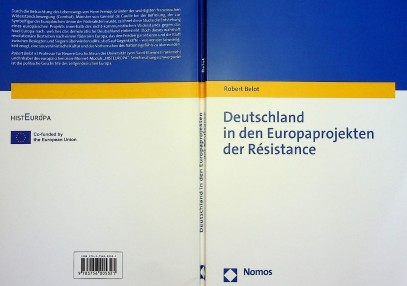
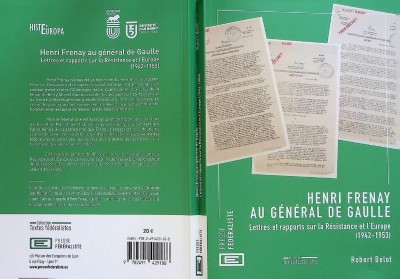
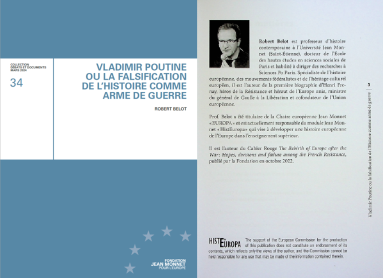
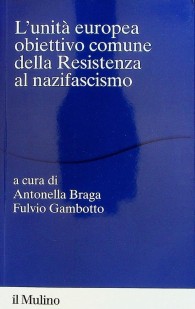
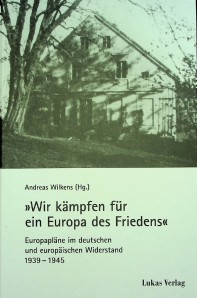
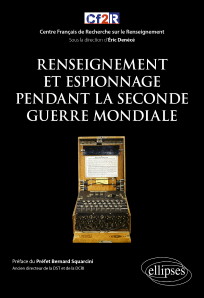
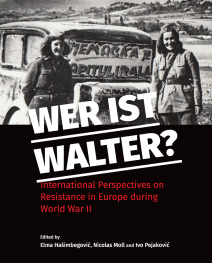
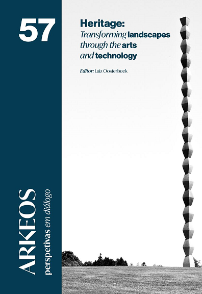
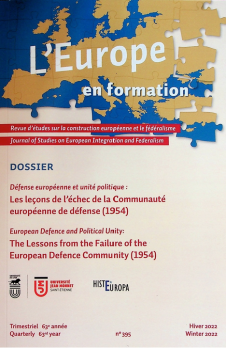
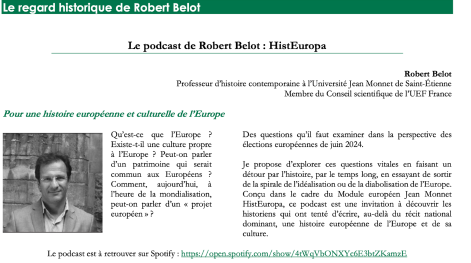
 Université Jean Monnet
Université Jean Monnet